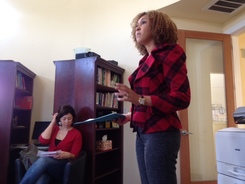 With many of us fearing public speaking more than we do our own deaths, its important to have a few tricks up your sleeve to manage the anxiety that comes along with this fear-inducing activity. This weekend, I was asked to give a presentation for a small networking group on the 4 keys to influence. It was my first time doing this particular presentation and my first time in front of this group. I've given presentations for larger groups and know that I'm a relatively competent speaker/facilitator, but I still get nervous each and every time I take on the task of leading a group of any size. So how do I manage that fear and anxiety while still performing?  Here's my speakers jitter checklist: 1) Put on my superman cape (aka, dress like a BOSS) Everyone has their personal version of a superman cape. Mine is a comfortable pair of pants, a ruffled blouse, and a well-cut blazer. Whatever yours is, you need to make sure it's available, clean, and pressed for the big day so you can feel like the powerful beast of a superhero you are. 2) Forgo the morning brew Caffeine is known to exaggerate our stress response, so I commonly avoid coffee, tea and soda drinks before any stressful event where I need to perform at a high level. Because I'm already feeling stressed, it helps to make sure I don't add insult to injury with coffee. 3) I put on my pre-show playlist I have compiled myself a great playlist of what I like to call "Boss Music." It's mainly a mixture of Niki Minaj, Beyonce's Sasha Fierce album, and a little Eminem, among others. The music is full of affirmations that I repeat out loud as I sing the playlist on the way to the event. 4) Arrive early and claim the space It's our natural inclination to feel more comfortable in a space we've become familiar with. By getting to know the space ahead of time, you release some of the fears that naturally occur when we're in a new place. Make sure you know where the entrances are and position yourself in a way that allows you to see when people walk into the room. This will increase your sense of safety and reduce your stress level. These are a few of my most important jitter relievers. Do you have one that you like to use? Tell me how you relieve your pre-show fears. Recommended Reading The Thing We Fear More Than Death, Psychology Today Blog Get your free copy of "The 4 Keys to Influence" workbook to create your plan for being more influential in your career.
0 Comments
 "Sherry, It's good to see you. How have you been?" Jacki asked. "Really busy. I have so much work to do this week," Sherry replied, looking at her computer screen. "Let me know if you'd like a walking buddy to take a break sometime," Jacki requested with a smile. "Sure, but like I said I'm really busy," replied Sherry, half glancing at Jacki. "I'll let you know if I can ever take a break." Does this dialogue sound familiar to you? Does Sherry remind you of someone you know at work? Does she remind you of yourself? Let's analyze this situation by asking a few questions first.
In this exchange, Jacki probably walked away feeling that Sherry doesn't want to spend time with her. She may even feel slighted by the way Sherry failed to fully engage with her. Had Sherry spent just 1-2 minutes fully engaging with Jacki, she might have avoided making her feel so badly about trying to spend time with a friend. What is a "half glance"? The half glance is when you're talking to someone, but you're focused on something else at the same time. We're all guilty of it sometimes, but it becomes a problem when we're spending more time not connecting than we spend actually connecting with other people. As human beings, we're natural connectors. We crave interactions with others, so when we do the opposite it hurts us by holding us back from our authenticity. The next time you find yourself in the midst of a half glance, put down your iPhone, step away from the computer, and turn your body fully towards the person talking to you. Nothing should stop you from spending a couple of minutes engaging with a colleague or friend. Tip: If you're really busy you can still take a few seconds to fully engage with the person who is talking with you. Give them just a minute of attention, then stop them and explain that you have a priority to handle, but will catch up with them at a later time. Be specific about your intentions and follow up when you said you will. This will help you avoid disappointing the other person and also builds trust in the relationship. Get your free copy of "The 4 Keys to Influence" workbook to create your plan for being more influential in your career. What happens when you ask someone "how are you?"and actually wait for an answer? It happened to me at a Starbucks one morning. Trust me, it's a weird story. I wake up groggy and mean. Not sure why, but it's been that way for years. My sisters love to tell this awful Christmas morning story about trying to wake me up and getting slapped. I don't recall, but I can imagine it wasn't a pretty sight. Anyways, I was at this Starbucks doing my normal groggy thing and looking down at my phone, my purse, and everything but anyone's eyes. There were 3 baristas and the first one, a woman asked me "how are you?" but I'm pretty sure I ignored her completely. Then, I encountered another barista, who asked "how are you?" I responded with "I'd like a Grande Soy Latte please" and continued to thumb through my phone to find the Starbucks app. After scanning my app, I moved on to the end of the bar where I awaited my drink, when the 3rd barista asked me "how are you." At that point I knew this had to be a game, or else they all really wanted to know how I was. Finally I just decided to answer him since he's looking me directly in the eyes, and I really had no where to go to escape his eye gaze. I said "I'm good." Then he asked "what do you have planned for today?" I scanned by brain for the answers and told him the stories of the two meetings I had planned, one with a former colleague that I was excited to chat with and another with a potential promotional partner for my women's group. The barista congratulated me on my great plans and handed me my coffee. He looked me in the eyes and said "I hope both of your meetings are as great as you hope." With that, I walked out with my coffee. I started this blog by asking the question "what happens when you ask 'how are you?' and actually wait for an answer." For me, it brought me into the present. When I walk around groggy and bug-eyed it's because I'm not present in the moment. I'm wishing I was back in bed, thinking about my responsibilities, and focused on the mission of getting my day started. By asking me about my day, the barista was able to bring me into the moment. I became reflective and thoughtful. And that moment of connection put me in a good mood. This is what people feel like when you ask "how are you?" and actually wait for an answer. How do you feel when someone asks "how are you?" Do you know someone who uses lots of jargon, big words, and long sentences? How do you feel when you're around that person? Chances are, you don't feel that they truly care about you when they're talking. It's more like they're talking to impress others and make themselves stand out as intelligent or accomplished. One of the biggest communication fails comes from what I like to call "talking big," which means you're more focused on making yourself look good than actually engaging with others. The unfortunate consequence of making yourself look big, is that it inherently makes others around you look smaller, which makes them feel uncomfortable. Here's a video example of this communication fail in action. Are you guilty of this?
If you are, this is something you can easily work on changing. By simplifying your speech, you give others the ability to connect with you without the barriers your big words can create. You don't have to "dumb down" your conversations, but you should always be aware of the perception others may have of you when you're in conversations with them. Here's an example. #Fail: "Now what I've found is an indispensable symmetry between the synergies created amongst the integrated marketing and the digital analytics organizations within the hierarchical structures of this powerful Fortune 200 global entity. #Winner: "What I've realized is that when our marketing teams work together rather than separately, they are able to accomplish so much more for the company. By reducing the jargon, the big-words, and the length of your communication, you make the conversation accessible to others. You are now more approachable, easier to relate to, and by and large more likely to connect with lots of people. I talk a lot about the power of human connection and how the best way to connect with people is through face to face contact. This video from Soul Pancake really embodies the lesson by showing the WHY behind face to face communication. When we look into each others' eyes and give quality eye-contact for a period of time, we really feel the connection with one another at a deeply human level. This is why speakers are taught to give eye contact around the room, because if they want their audience to connect with their message, they need to connect with the speaker first and foremost. Homework: Pay attention to your eye contact for the next 24 hours. How much eye contact do you give to others when you're having a conversation? Do you look away often, or give eye contact the entire time you're talking? Make a note in a journal and set a goal for improving the eye contact you give to others. It feels really awkward at first, but after a while it will become common practice. People say I have a cool job, and they're right. I'm the girl that's compelling, influential, and creative -- at least, that's the perception that comes along with this gig. I won't complain about that.
But there's one thing that always messes with my head a little. Anyone could do my job, but they just don't. When you think about it, the concept of communicating is as simple as 1,2,3. Step 1: Decide what you want other people to do. Step 2: Figure out what would inspire them to do it. Step 3: Ask them to do it the way that will inspire them to do it. It really is that simple, but most human beings I know don't like to think that way. They say "I'm not a salesperson" or "I'm more of the analytical type." What? So you can't communicate with people because you're not the type. I call bull*[censored]. Everyone has the innate ability to communicate and influence others to act. It's just a part of life, but some people have been lied to. Someone told you the story that you aren't a good communicator (or salesperson, or marketer, or leader). And you believed them. I say, it's time to get off your analytical high horse and start learning to communicate. Be the person who can compel others to act. Sell. Market. Lead. Influence. Now I know this isn't the nicest way to start a personal blog. This really is my very first post.
But I feel a professional obligation to teach people to communicate effectively, so here is my first big tip. This tidbit I'm about to share is the reason I get paid. It's what separates me from all the other yahoos in the world writing slop and calling it a message. Ok. Here goes. Communication is not about you. There. I said it. I know it hurts, but really, do you ever stop to consider the person on the other end of your communication? Many wonderfully intelligent and interesting people fail at this most important skill. When communicating in any form, always consider your audience first. This is relevant in both professional and everyday communication -- written, verbal or video. What does this mean in practical terms? In an everyday conversation, it means asking questions more than you talk, giving information in ways that the other person can easily understand it, and focusing on topics the listener actually cares about rather than what you want to share. Professionally, it means stopping to listen when you ask "how are you?" It also means eliminating jargon when you're talking to people out of your industry (or better yet, forget jargon altogether. We don't need new words). And lastly, it means being succinct with messaging so you can stop wasting people's time. Now I've just given away the secrets of my industry. My career is over. Darn. |
Categories
All
My Favorite BooksResources |
MENU
Email: krystal@goleadconsulting.com
Phone: 720-515-3078
Mailing Address
Go Lead Consulting
1580 N Logan St Ste 660 PMB 62223
Denver, Colorado 80203, US
Phone: 720-515-3078
Mailing Address
Go Lead Consulting
1580 N Logan St Ste 660 PMB 62223
Denver, Colorado 80203, US

 RSS Feed
RSS Feed